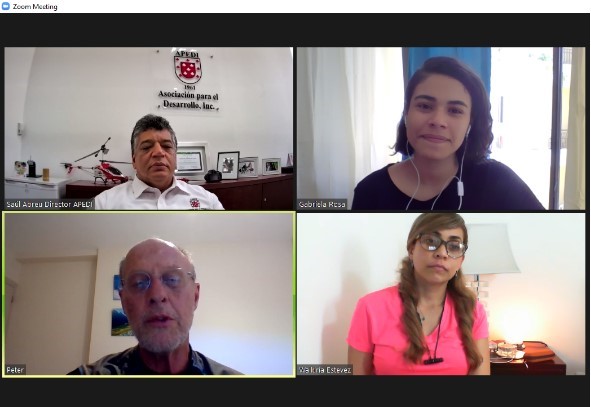Creating an Environmental Manual for Watershed Conservation in the Dominican Republic
 |
| Review meeting with volunteer Peter Phillips, APEDI director Saul Abreu, Fondo Agua Yaque del Norte director Walkiria Estevez and F2F field officer Gabriela Rosa. |
The Yaque del Norte Basin is the
most important hydrographic basin in the Dominican Republic, with an area of
more than 7,000 square kilometers, equivalent to 15% of the national
territory. It affects 40 municipalities within six provinces in the Central Cibao
and Northwestern Cibao regions, where approximately 1.8 million people live. The
main river that gives its name to this basin is the Yaque del Norte, the
longest in the Dominican Republic, with a route of almost 300 kilometers from
its source in Jarabacoa, in the Central mountain range, to its mouth
in Montecristi.
Because of its importance, many organizations
work towards the conservation of this river and basin. The Farmer-to-Farmer (F2F)
Program in the Dominican Republic has been working with two special ones: The first one is Fondo Agua Yaque del Norte, an association focused on raising funds and building a fund managed as a
trust, whose income is used for environmental conservation and recovery efforts
that promote water generation in the Yaque del Norte river basin. The second one is Asociación para el Desarrollo, Inc. (APEDI), a non-profit organization
created with the objective of promoting economic and social development in the
Dominican Republic. APEDI was founded in 1961 and was the first organization of
its kind in the country.
As both organizations promote
initiatives and projects that advocate for the conservation of water and other
natural resources, they wanted to create an environmental education manual
focused on ecological conservation that could be used by universities, schools, and other
educational programs. A very special F2F remote volunteer was recruited to
guide the organizations’ staff and advise them on the topics and content for
the manual: Peter Phillips, a Biology Professor Emeritus from Winthrop
University in South Carolina. Peter is very familiar with the Yaque del Norte Basin, as
he has extensive research and teaching experience in marine and aquatic
resources, tropical biology, research methods, bioremediation, zoology and
general biology in both English and Spanish.
 |
Local Volunteer Rashel Santana presenting the first designs to APEDI and Fondo Agua Yaque del Norte, with the appropriate social distance due to COVID-19.
Due to the continued international travel disruptions caused by the COVID-19, in July USAID approved a waiver for its traditional F2F program format, pairing U.S. remote volunteers (like Peter Phillips) with local volunteers in host countries, for collaboration, support, and assistance. Therefore, local volunteer Rashel Santana, a finishing graphic design student, started volunteering for this assignment in mid-September. She will be in charge of the graphic design of the manual.
From Santiago and Santo Domingo to Washington and Seattle, virtual teamwork has proven to be effective and has opened new opportunities we could never have imagined!
 |
Presentation of local volunteer Rashel Santana to the team.

.png)

Comments
Post a Comment